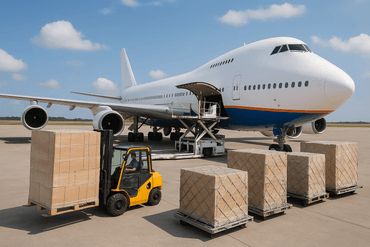
Why and When Your Ocean Freight Shipment Would Require a Bonded Warehouse



Customs regulations are a necessary, but challenging part of international shipping. Clearing customs increases costs, paperwork, and time-delays. Customs-bonded warehouses help reduce this friction and are an integral part of the global supply chain.
What is a bonded warehouse?
A customs bonded warehouse is a secured building or area where merchandise can be imported and stored for a period of time, without any import taxes (duties) being charged. Duties are only paid when the goods are removed for domestic use.
No duties are charged If the merchandise is re-exported, destroyed by customs, or withdrawn for use on an international vehicle or aircraft. The United States permits eleven types of bonded warehouses, where imported goods can be kept for up to five years.
While in bonded storage, merchandise can be handled and manipulated as long as the processing doesn’t change its essential nature. All types of products can be kept in bonded storage, including animals and restricted materials.
When is a customs bonded warehouse recommended?
Customs bonded storage is a smart option for long-term financial planning and resource control. Using bonded warehouses to defer taxes on imported items can improve cashflow management, reduce financial liabilities, lower expenditures, and protect against political risk.
Long Term Bonded Storage
Bonded warehouses can be used to manage the financial burden of import taxes. If imported dutiable merchandise will not be sold immediately, inventory can be kept in bonded storage to avoid a large upfront tax payment.
Importers can then retain control over those monies and have them available for other purposes. Since applicable duties are only paid when the goods are removed after being sold, cash-strapped importers can fund their duty payments from the sale of the goods.
Customs bonded warehouses can also be used to hold merchandise that has low or fluctuating demand. If demand increases the merchandise can then be withdrawn for domestic use. If it doesn’t, the products can be re-exported without duty charges.
Right now, the global supply chain is in disarray due to Covid-19. Shutdowns and demand disruptions created supply chain bottlenecks and inventory build-ups. Luxury items like perfume are experiencing much lower demand. Bonded storage is being used to store excess product and let enterprises avoid paying customs on those items.
Restricted Specialty Item Risk Management
Bonded storage can be a preferable choice for storing restricted goods. Since customs bonded warehouses can store imports for up to five years, shorter time regulations for the storage of restricted products do not apply to them.
Importers who need extended time for processing paperwork or legalities to clear customs can use bonded storage to bypass these regulations.
Political and Economic Risk Management
Bonded storage can be used to protect against political instability and policy fluctuations. If merchandise is imported during times of high tariffs, bonded storage gives the chance to wait for more favorable economic conditions. Customs bonded warehousing has proved a highly effective strategy in navigating the tariffs of the Trump administration.
Exporters, importers, and manufacturers sought approval to establish their own bonded warehouses and storage areas. While the nation experienced rapidly changing foreign policy, these facilities became stable domestic zones for production and trade. Manufacturers and retailers were able to continue engaging in commerce while mitigating potential fallout.
Handling and Prepping for Market
If merchandise needs to be immediately prepped for market, this can be done in special customs bonded warehouses. Taxes are then determined on the final product when it is withdrawn from storage. This can prevent extra duties from being charged on material that does not make it to market.
For example, if food is brought in which needs to be sorted or processed, importers can avoid paying tax on discarded product.
Logistical Streamlining
Goods are also imported into customs bonded warehouses, simply to help smooth out the logistical process of clearing customs. Having goods placed in secure, duty-free storage gives peace of mind and more time for paperwork to be done.
How does bonded storage work?
Customs bonded warehouses can be owned either directly by the government or by licensed private enterprises. Some privately run bonded warehouses are for the proprietor’s use only, while others are available for public use.
Merchandise kept in privately operated warehouses, is under the joint supervision and joint custody of Customs Border Patrol and the warehouse proprietor. Customs retains full authority over the goods in the warehouse, but generally maintains control through periodic audits.
Private operators will take out a warehouse bond under which they incur liability for stored merchandise. This liability is discharged when the goods are exported, destroyed by Customs, or withdrawn domestically after duties are paid.
Customs-bonded warehouses are generally located at or near ports. Shipments are received directly to them. Many privately owned, public use warehouses will offer complementing services such as freight forwarding, logistics, distribution, and deliveries.
Certain classes cater to niche needs, such as livestock management, food handling, or receiving regulated products.
Once goods are withdrawn, importers will need to pay merchandise-processing fees in addition to duties. These fees should be negotiated carefully by evaluating different freight-forwarding services to find the best deal.
Supply Chain Resilience
Customs bonded warehouses are a key asset for global economic stability and security. Businesses rely on customs bonded storage as a core resource for financial control and risk management. Beyond cash flow management, this also creates economic confidence for trade to continue in uncertain conditions.
The recent China-USA tariff wars and Covid-19 supply chain chaos have proven their continued relevance as a stabilizing measure for international trade. Bonded storage is well integrated into freight shipping logistics. Enterprises looking to streamline and optimize the process of ocean freight shipping should take advantage of these secure, managed facilities.
Customs bonded warehouses are proven ways of mitigating the costs of heavy tariffs and regulations.
Related Articles


